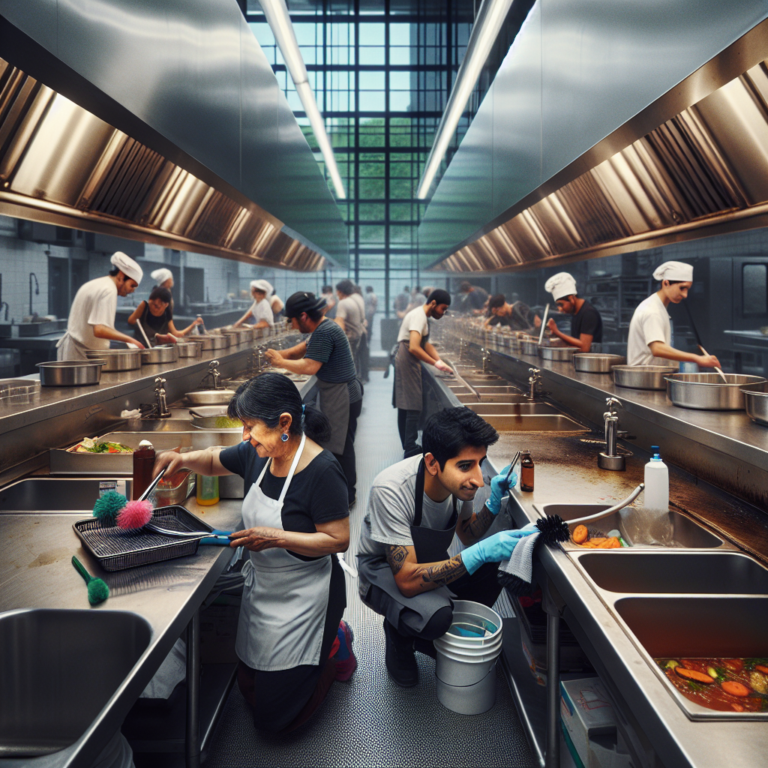Essential Hood Cleaning: Why Employee Training Matters for Kitchen Safety
Why Training on Hood Cleaning Is Essential
In the bustling city of New Orleans, the restaurant industry thrives on good food and a memorable dining experience. However, behind every successful restaurant is a well-maintained kitchen, and one often overlooked component is the restaurant hood. Hood cleaning isn’t just about aesthetics; it’s crucial for safety, efficiency, and compliance with health regulations. Training your team on proper hood cleaning procedures ensures that your establishment runs smoothly and safely. In this article, we’ll delve into why restaurant hood cleaning is so important and how you can equip your team with the essential knowledge they need.
The Dangers of Neglecting Hood Cleaning
Restaurant hoods are designed to capture grease, smoke, and other airborne particles within a kitchen environment. Over time, these substances can build up, creating potential fire hazards and reducing the efficiency of your exhaust system. Here’s a closer look at the risks of neglecting restaurant hood cleaning:
- Fire Hazards: Grease buildup can ignite, leading to kitchen fires that endanger lives and property.
- Health Risks: Poor hood hygiene can result in the accumulation of mold and bacteria, contaminating the kitchen environment.
- Inefficiency: A clogged hood system makes your equipment work harder, resulting in higher energy costs and reduced lifespan of the equipment.
- Regulatory Compliance: Failing to adhere to health and safety standards can lead to hefty fines and even the closure of your restaurant.
Training Your Team on Hood Cleaning Procedures
Ensuring your team is well-versed in commercial kitchen hood cleaning is paramount. Here’s how you can effectively train your employees:
Start with the Basics
Your team should understand the anatomy of the hood system, including the filters, ducts, and fans. Provide detailed instructions on how each component functions and the importance of keeping them clean. Illustrations and hands-on demonstrations can be particularly helpful.
Outline the Cleaning Process
Create a step-by-step guide that walks your team through the cleaning process. Key steps should include:
- Removing Filters: Explain how to safely remove and clean filters, emphasizing that filters need soaking in de-greasing solutions before scrubbing.
- Scrubbing and Washing: Show the best ways to scrub off grease and grime from the hood surface and the ducts. Highlight the importance of using appropriate cleaning supplies to avoid damaging the equipment.
- Inspecting for Damage: Teach your team to look for wear and tear or any damage during the cleaning process, emphasizing the need for timely repairs.
- Reassembling and Testing: Guide them on reassembling the hood components correctly and performing a test run to ensure everything is in working order.
Frequency of Cleaning
The frequency of exhaust hood cleaning can vary depending on the type of food you’re preparing and the volume of cooking. As a rule of thumb:
- High-volume kitchens (24/7 operations): Clean monthly.
- Average-volume kitchens: Clean quarterly.
- Low-volume kitchens: Clean semi-annually.
Make sure to schedule regular cleanings in alignment with these timelines to maintain the effectiveness of your hood system.
Emphasize Safety
Cleaning hoods involve dealing with chemicals and potential hazards. Educate your team on safety precautions, including:
- Wearing protective gear like gloves and goggles.
- Ensuring proper ventilation when using chemical cleaners.
- Avoiding the use of open flames or heat sources during cleaning.
- Knowing the emergency procedures in case of an accident.
Using Professional Hood Cleaning Services in New Orleans
While training your team on exhaust hood cleaning is essential, it’s also a good idea to enlist professional services for a thorough clean, especially for hard-to-reach areas. In New Orleans, companies specialize in hood cleaning and can provide a comprehensive service that ensures every inch of your system is spotless.
Benefits of Professional Services
Professional cleaners offer numerous benefits:
- Expertise: Professionals are trained and knowledgeable about the latest cleaning techniques and safety standards.
- Efficiency: They can complete the job quicker and more efficiently, minimizing downtime in your kitchen.
- Compliance: They ensure your kitchen meets all health and safety regulations, giving you peace of mind.
- Maintenance: They can identify potential issues before they become major problems, helping you avoid costly repairs.
Finding the Right Service
When choosing a professional service for New Orleans Hood Cleaning, look for the following:
- Positive reviews and testimonials.
- Competitive pricing and clear service agreements.
- Certification and compliance with local regulations.
- A solid reputation in the New Orleans restaurant community.
Conclusion
Training your team on the essential knowledge of hood cleaning is a crucial step in maintaining a safe, efficient, and compliant kitchen. From understanding the risks of buildup to mastering the cleaning techniques, your staff’s expertise can make a significant difference in your restaurant’s operations. And remember, when in doubt, seeking the assistance of professional restaurant hood cleaning services can further ensure your kitchen’s top-notch condition.
To learn more about professional New Orleans Hood Cleaning, visit our website.







